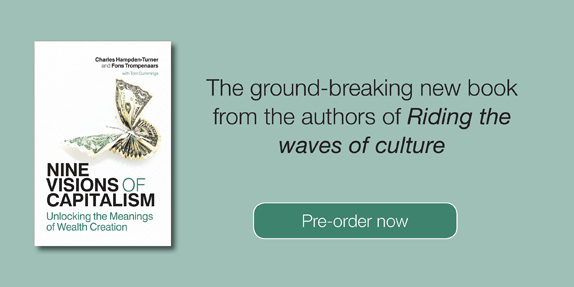Conscious consumerism and the distribution of patronage
5 August 2015 by Catherine Holdsworth in Business and finance, Nine visions of capitalism
Capitalism has changed the way we shop, there is no denying it. Where once a high street would be populated with a butcher’s and a baker’s (perhaps too a candle-stick maker?) we now have colossal supermarkets offering everything we need under one roof and for seemingly a better deal than the smaller shops. Capitalism should strike a balance between big companies and smaller ones. Charles Hampden-Turner and Fons Trompenaars’ book Nine visions of capitalism offers some ways in which conscious capitalism, and in turn conscious consumerism can benefit those who really do live on the other side of the world.
It’s true that consumers are coin-operated and you’d be hard-pressed to find many people who would reject a good deal. If you can get the same product at a cheaper rate from a bigger company, then why would you spend the extra money? How much power do consumers really have over capitalist giants such as Amazon, Google and Starbucks? Well quite a lot, it would seem. Sure, one person would have a mighty job trying to bring down a huge company on their own, but in the social media age, where everyone’s a critic, word of mouth and customer service means more to giant companies than you think. Amazon describes itself as the most ‘customer-centric’ company, offering every product you could wish for from the supermarket in the sky. The recent Amazon Prime day, which had more deals then the Generation Game, was brilliant in that it got thousands of people to sign up to the service for the ’30 day free trial’ but then relies on the apathy of the customers not to bother cancelling their subscription. Brilliant. Customers think they’re getting the best deals and Amazon are set to make a huge amount of revenue.
But is cheaper always better? We recently blogged about whether Amazon Prime Day was good for publishers and we understand the value of a good brand. When you see a Starbucks or McDonald’s while backpacking in Timbuktu, there’s a sense of the known and familiar, a comforting feeling that you’re not so far from home and you associate those brands with the everyday. You can be on the other side of the world from your home but there will always be a capitalist giant to remind you that the world is smaller than you think. This logic of the familiarity is easy to transfer to the everyday life. With a Starbucks coffee, you know what you’re going to get. You know that Coca-Cola will taste the same in Austria as it does in Australia and perhaps it is the fear of the unknown that drives consumers to these brands.

However, consider for a moment that you don’t get your morning coffee from Starbucks, but instead from the independent coffee house around the corner. You’re more often than not likely to get better-quality coffee and better customer service. That is not to say that is the way for all independent coffee houses, but if you’re going to compete with giants such as Costa and Starbucks, you’ve got to care about your customers and care about your product. Otherwise, what’s the point? Customer service is valued now more than ever. If you want a book recommendation, Amazon can tell you what other customers who viewed certain items bought, but if you go into a book shop, you can ask for personal recommendations. Booksellers are usually incredibly knowledgeable when it comes to their products, in a way that cannot be substituted by an Amazon algorithm.
The balance of patronage lies in the hands of you, the consumer. We all love the ease with which we can do our weekly shop, or use the ‘one-click’ service online. It’s great when packages fall through our letterboxes and we feel even better knowing that we’ve got a bargain. There is a backlash against large companies and their seemingly untouchable power. Last year a loyal customer of Caffe Nero returned his loyalty card after finding out that the company had been avoiding tax. Integrity goes a long way and these large companies are endangering the positive aspects of capitalism. Perhaps next time you feel like buying the latest best-seller for a ‘better than half price’ deal, consider sharing your patronage with those independent shops. For the extra money you may find you reap the rewards in other ways.

